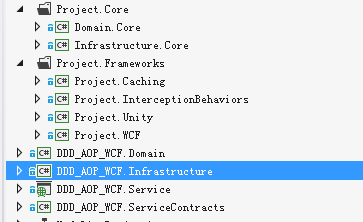DDD(八)【基础设施层】
最近被DDD吸引了阿,在这里感谢一下小佟,呵呵,领域驱动设计是个不错的东西,帮助我们把问题清晰化,这候对于复杂业务逻辑是很重要的,今天这一讲主要说一下DDD中的基础设施层(Infrastructure)是如何被我实现的。
Infrastructure Layer:主要功能是对领域模块进行持久化的,在这个层中你需要把领域对象序列化到指定的元件中,可能是数据库,文件或者内存对象,当然它也要提供从物理元件取出数据到领域模型的功能,这是对应的。
目前的DDD项目结果如下

对于Infrastructure这个层我不去定义接口而是让它去实现Domain层的接口,即一切从领域出发,而Infrastructure只负责具体的数据持久化工作,下面我们主要介绍一下IRepository.cs和IExtensionRepository.cs在Infrastructure层是如何被实现的。
与传统DATA层的区别
一 传统Data层定义接口,为数据为导向,而不是以业务为导。
二 将Repository的方法中添加了领域规约,使它Infrastructure更有目的的去实现。
引入工作单元,使多方法形式一个事务的概念
IUnitOfWork接口也是在domain层实现的,不过在这里我们也介绍一下它的代码
public interface IUnitOfWork
{
/// 工作单元会有保存save操作和是否显示提交的属性,开发人员可以根据业务情况去选择IsExplicitSubmit的状态,默认是自动提交,如果希望多个方法统一一次提交,可以将IsExplicitSubmit设为true,然后手动进行save(),这是有助于提升程序性能的。
Infrastructure层的核心代码
public class DbContextRepository<TEntity> :
IExtensionRepository<TEntity>
where TEntity : class
{
#region Constructors
public DbContextRepository(IUnitOfWork db, Action<string> logger)
{
iUnitWork = db;
_Db = (DbContext)db;
Logger = logger;
((IObjectContextAdapter)_Db).ObjectContext.CommandTimeout = 0;
}
public DbContextRepository(IUnitOfWork db)
: this(db, null)
{ }
#endregion
#region Properties
/// 成员
public virtual void Insert(TEntity item)
{
OnBeforeSaved(new SavedEventArgs(item, SaveAction.Insert));
_Db.Entry<TEntity>(item);
_Db.Set<TEntity>().Add(item);
this.SaveChanges();
OnAfterSaved(new SavedEventArgs(item, SaveAction.Insert));
}
public virtual void Delete(TEntity item)
{
OnBeforeSaved(new SavedEventArgs(item, SaveAction.Delete));
_Db.Set<TEntity>().Attach(item);
_Db.Set<TEntity>().Remove(item);
this.SaveChanges();
OnAfterSaved(new SavedEventArgs(item, SaveAction.Delete));
}
public virtual void Update(TEntity item)
{
OnBeforeSaved(new SavedEventArgs(item, SaveAction.Update));
_Db.Set<TEntity>().Attach(item);
_Db.Entry(item).State = EntityState.Modified;
this.SaveChanges();
OnAfterSaved(new SavedEventArgs(item, SaveAction.Update));
}
public IQueryable<TEntity> GetModel()
{
return _Db.Set<TEntity>().AsNoTracking();//对象无法自动添加到上下文中,因为它是使用 NoTracking 合并选项检索的。请在定义此关系之前,将该实体显式附加到 ObjectContext。
// return _Db.Set();
}
#endregion
#region IExtensionRepository 成员
public virtual void Insert(IEnumerable<TEntity> item)
{
item.ToList().ForEach(i =>
{
_Db.Entry<TEntity>(i);
_Db.Set<TEntity>().Add(i);
});
this.SaveChanges();
}
public virtual void Delete(IEnumerable<TEntity> item)
{
item.ToList().ForEach(i =>
{
_Db.Set<TEntity>().Attach(i);
_Db.Set<TEntity>().Remove(i);
});
this.SaveChanges();
}
public virtual void Update(IEnumerable<TEntity> item)
{
item.ToList().ForEach(i =>
{
_Db.Set<TEntity>().Attach(i);
_Db.Entry(i).State = EntityState.Modified;
});
this.SaveChanges();
}
public void Update<T>(Expression<Action<T>> entity) where T : class
{
T newEntity = typeof(T).GetConstructor(Type.EmptyTypes).Invoke(null) as T;//建立指定类型的实例
List<string> propertyNameList = new List<string>();
MemberInitExpression param = entity.Body as MemberInitExpression;
foreach (var item in param.Bindings)
{
string propertyName = item.Member.Name;
object propertyValue;
var memberAssignment = item as MemberAssignment;
if (memberAssignment.Expression.NodeType == ExpressionType.Constant)
{
propertyValue = (memberAssignment.Expression as ConstantExpression).Value;
}
else
{
propertyValue = Expression.Lambda(memberAssignment.Expression, null).Compile().DynamicInvoke();
}
typeof(T).GetProperty(propertyName).SetValue(newEntity, propertyValue, null);
propertyNameList.Add(propertyName);
}
_Db.Set<T>().Attach(newEntity);
_Db.Configuration.ValidateOnSaveEnabled = false;
var ObjectStateEntry = ((IObjectContextAdapter)_Db).ObjectContext.ObjectStateManager.GetObjectStateEntry(newEntity);
propertyNameList.ForEach(x => ObjectStateEntry.SetModifiedProperty(x.Trim()));
this.SaveChanges();
// ((IObjectContextAdapter)_Db).ObjectContext.Detach(newEntity);
}
public TEntity Find(params object[] id)
{
return _Db.Set<TEntity>().Find(id);
}
public IQueryable<TEntity> GetModel(ISpecification<TEntity> specification)
{
return GetModel().Where(specification.SatisfiedBy());
}
public IQueryable<TEntity> GetModel(Expression<Func<TEntity, bool>> predicate)
{
return GetModel().Where(predicate);
}
public IQueryable<TEntity> GetModel<S>(Expression<Func<TEntity, S>> orderByExpression, bool asc)
{
Orderable<TEntity> order = new Orderable<TEntity>(this.GetModel());
if (asc)
order.Asc(orderByExpression);
else
order.Desc(orderByExpression);
return order.Queryable;
}
public TEntity Find(Expression<Func<TEntity, bool>> predicate)
{
return GetModel(predicate).FirstOrDefault();
}
public TEntity Find(ISpecification<TEntity> specification)
{
return GetModel(specification).FirstOrDefault();
}
public void BulkInsert(IEnumerable<TEntity> item)
{
DataPageProcess(item, (currentItems) =>
{
((IObjectContextAdapter)_Db).ObjectContext.CommandTimeout = 0;//永不超时
_Db.Database.ExecuteSqlCommand(DoSQL(currentItems, SQLType.Insert));
});
}
public void BulkDelete(IEnumerable<TEntity> item)
{
DataPageProcess(item, (currentItems) =>
{
((IObjectContextAdapter)_Db).ObjectContext.CommandTimeout = 0;//永不超时
_Db.Database.ExecuteSqlCommand(DoSQL(currentItems, SQLType.Delete));
});
}
public void BulkUpdate(IEnumerable<TEntity> item, params string[] fieldParams)
{
DataPageProcess(item, (currentItems) =>
{
((IObjectContextAdapter)_Db).ObjectContext.CommandTimeout = 0;//永不超时
_Db.Database.ExecuteSqlCommand(DoSQL(currentItems, SQLType.Update, fieldParams));
});
}
public void BulkUpdate(IEnumerable<Expression<Action<TEntity>>> expressionList)
{
DataPageProcess(expressionList, (currentItems) =>
{
StringBuilder sqlstr = new StringBuilder();
currentItems.ToList().ForEach(i =>
{
Tuple<string, object[]> sql = CreateUpdateSQL(i);
sqlstr.AppendFormat(sql.Item1, sql.Item2);
});
((IObjectContextAdapter)_Db).ObjectContext.CommandTimeout = 0;//永不超时
_Db.Database.ExecuteSqlCommand(sqlstr.ToString());
});
}
public event Action<SavedEventArgs> AfterSaved;
public event Action<SavedEventArgs> BeforeSaved;
#endregion
#region Protected Methods
/// 下面看一下对于基础设施层所依赖的程序集

可以看到,它主要依赖于领域实体层与领域实体规约层。
OK,对于基础设施层的搭建就说到这,下回我们将说一下领域层的搭建。